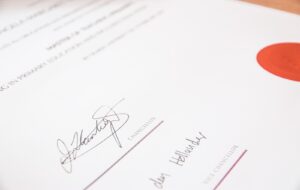How To Hire The Right Bookkeeper For Your Business
In the colorful tapestry of a thriving business, there’s one thread that binds everything together – sound financial management. At its core stands a diligent bookkeeper, the unsung hero, translating numbers into stories of success, challenges, and opportunities. While products might be the heart and marketing the voice, finances are undoubtedly the backbone of any enterprise. So, how does one find this cornerstone professional who’s both a numbers guru and a guardian of financial integrity? Let’s embark on this journey to hire the right bookkeeper for your business.
Understand Your Needs
 Bookkeeping is not a one-size-fits-all service. As a business owner, a holistic understanding of your financial requirements is pivotal in the hiring process. Start by considering the size of your business. A startup might have financial operations that, while critical, can be less intricate compared to a large corporation. This difference could translate into the complexity of transactions, the volume of financial data, or the breadth of financial reporting required.
Bookkeeping is not a one-size-fits-all service. As a business owner, a holistic understanding of your financial requirements is pivotal in the hiring process. Start by considering the size of your business. A startup might have financial operations that, while critical, can be less intricate compared to a large corporation. This difference could translate into the complexity of transactions, the volume of financial data, or the breadth of financial reporting required.
Consider the cyclical nature of your business. If it’s seasonal, you may find periods of intense financial activity, demanding more hands-on bookkeeping, while off-seasons could see lulls. Recognize such patterns to ensure you hire a bookkeeper prepared to adapt to your business’s ebb and flow.
Outline specific tasks. Do you need just transaction logging, or is there a need for financial forecasting? Are there industry-specific financial regulations to consider? Will the bookkeeper also handle payroll or tax filings? A comprehensive understanding of such nuances ensures that you hire someone tailored to your business’s precise needs, ensuring both efficiency and cost-effectiveness. Essentially, introspecting on these aspects will not only aid in finding the right fit but also in streamlining your financial operations.
Look for Relevant Experience

Experience is more than just a time metric; it’s about relevance. In the diverse landscape of businesses, each industry brings its own set of financial intricacies. Hiring someone who understands these nuances ensures a smoother workflow. For instance, the financial challenges and regulations in the hospitality sector can vary vastly from those in a tech startup.
When seeking experience, delve into the specific industries the bookkeeper has worked in. Are they familiar with the kind of vendors you deal with? Do they understand the tax implications relevant to your products or services? Such industry-specific knowledge can significantly reduce the learning curve.
We live in an age of digital transformation. Bookkeeping isn’t restricted to ledgers and journals; it’s also about software proficiency. Familiarity with industry-relevant software tools is crucial. But beyond mere familiarity, the ideal candidate would know how to harness these tools for insightful financial analytics, offering a competitive edge to your business. In essence, relevant experience combines the wisdom of past scenarios with the tools of the present, ensuring a future-proof financial strategy.
Check for Qualifications and Training
While the adage “Experience is the best teacher” rings true, the importance of formal qualifications in bookkeeping cannot be overstated. Recognized certifications and degrees provide a baseline assurance of the candidate’s competence. They reflect a structured understanding of financial best practices, regulations, and methodologies. For instance, a certified bookkeeper would be well-versed in standard accounting principles, ensuring consistency and accuracy in financial recording.
However, the financial landscape is ever-evolving. Tax codes change, new financial regulations emerge, and software tools undergo updates. This dynamic nature necessitates continuous learning. A dedicated bookkeeper would be committed to staying updated, either through refresher courses, workshops, or additional certifications. Their commitment to ongoing education is not just indicative of their dedication to their profession, but it’s also a testament to their drive to bring the latest knowledge and best practices to the table. Therefore, while hiring, it’s essential to weigh both their foundational qualifications and their zeal for continuous professional development.
Ask for Recommendations

Referrals and recommendations serve as an invaluable asset in the hiring process. They often provide a level of trust and assurance that online listings or cold calls can’t match. When looking for a bookkeeper, tap into your professional network. Industry peers, colleagues, or business partners might have had firsthand experiences with bookkeepers who might be a perfect fit for your needs. A trusted recommendation means the bookkeeper has already proven their worth in a similar setting.
The digital age has made recommendations even more accessible. Platforms like LinkedIn provide insights into a candidate’s professional trajectory. Here, endorsements and recommendations from previous employers or clients can offer a deeper understanding of the bookkeeper’s capabilities. While these online testimonials are beneficial, it’s essential to ensure their genuineness. Look for detailed recommendations rather than generic endorsements, as they provide a more comprehensive view of the bookkeeper’s expertise.
Test Their Skills

Merely listing skills and qualifications on a resume is one thing; demonstrating them in real-time is another. Before bringing a bookkeeper onboard, consider setting up a practical test or simulation. This exercise should emulate the kind of financial challenges or tasks they might face while working for your business. It’s not just about checking if they can balance accounts or use specific software; it’s about gauging their problem-solving approach, attention to detail, and adaptability.
Such a test also offers insights into their critical thinking abilities. Can they foresee potential financial challenges? Do they offer solutions that align with your business’s goals? Moreover, their presentation of the solution can shed light on their communication skills – an essential trait to ensure clarity and transparency in financial matters. In essence, practical tests serve as a mirror to their on-paper qualifications, reflecting their real-world applicability.
Interview Potential Candidates
 While resumes, tests, and recommendations provide a comprehensive view of the bookkeeper’s professional side, interviews help you gauge their personal attributes. A face-to-face interaction, whether physical or virtual, allows you to assess their fit within your company’s culture. It offers insights into their character, values, and overall mindset.
While resumes, tests, and recommendations provide a comprehensive view of the bookkeeper’s professional side, interviews help you gauge their personal attributes. A face-to-face interaction, whether physical or virtual, allows you to assess their fit within your company’s culture. It offers insights into their character, values, and overall mindset.
During the interview, go beyond the typical questions. Discuss real-world financial scenarios, even past challenges your company faced, and evaluate their solutions. This dialogue can shed light on their analytical thinking, foresight, and innovative approach. Moreover, it’s essential to gauge their passion for their role. A dedicated bookkeeper isn’t someone who merely logs numbers but is genuinely interested in optimizing finances to foster business growth.
The interview process helps establish initial rapport. Since bookkeeping involves handling sensitive financial data, trust is paramount. The interview provides an opportunity to start building this trust, ensuring a harmonious working relationship from the outset.
Ensure They Understand Confidentiality
 Handling a business’s financial records carries a significant responsibility. These records are not just numbers; they encapsulate the company’s financial health, strategies, and future prospects. Hence, confidentiality is of utmost importance. A potential bookkeeper must be someone you can trust implicitly with this sensitive information.
Handling a business’s financial records carries a significant responsibility. These records are not just numbers; they encapsulate the company’s financial health, strategies, and future prospects. Hence, confidentiality is of utmost importance. A potential bookkeeper must be someone you can trust implicitly with this sensitive information.
However, trust isn’t just a matter of gut feeling. It needs to be fortified with professional ethics and, if necessary, legal agreements. Discussing confidentiality openly with the candidate is paramount. Ensure they understand the gravity of mishandling information or sharing it inappropriately. Some companies choose to have new hires sign a Non-Disclosure Agreement (NDA) to legally underline the importance of confidentiality. This document legally binds the bookkeeper to maintain discretion and not divulge any company secrets.
Delve into their practices related to data security. As much of modern bookkeeping is digital, it’s vital to ensure they are familiar with secure data handling, storage methodologies, and backup strategies to maintain data integrity and protection against breaches.
Negotiate Terms Clearly

Clarity in terms of employment or engagement ensures a smooth working relationship. It’s essential to set clear expectations from the outset. Whether it’s about their roles and responsibilities, hours of work, or compensation, every aspect needs open negotiation and documentation.
Discussing payment structures, be it hourly, monthly, or project-based, will prevent potential disputes. If the bookkeeper will work remotely, decide on the tools and software to be used and how often they should check in or provide updates.
Consider the scope of their work. Will they only handle transactional entries, or will they also be responsible for financial analysis and forecasting? Will they be a part of financial strategy meetings? By clarifying these terms, you ensure the bookkeeper knows exactly what’s expected, and you, as a business owner, know precisely what you’re getting.
Remember, a successful bookkeeper-business relationship thrives on mutual understanding, and clarity in terms paves the way for this understanding.
Consider Cultural Fit
 Every company has its distinct ethos, values, and operational rhythm. Beyond professional competence, it’s essential to ensure that the bookkeeper aligns well with your company’s culture. A misfit can disrupt harmony, impacting not just the financial department but also the broader organizational environment.
Every company has its distinct ethos, values, and operational rhythm. Beyond professional competence, it’s essential to ensure that the bookkeeper aligns well with your company’s culture. A misfit can disrupt harmony, impacting not just the financial department but also the broader organizational environment.
During the hiring process, engage in open dialogues about company values, work ethics, and expectations. Gauge their response and try to discern if they are merely agreeing or genuinely resonate with what’s being said. Also, consider their adaptability. The business world is dynamic, with frequent changes and pivots. The right bookkeeper should be someone adaptable and resilient in the face of these changes.
Interpersonal skills matter. A bookkeeper will often have to liaise with various departments, from procurement to sales. Their ability to communicate effectively, understand concerns, and offer solutions is vital for seamless operations.
Consider feedback from team members who interacted with the candidate during the interview process. Their perceptions and feelings can offer additional insights into the bookkeeper’s potential cultural fit. After all, a harmonious workplace is often more productive and innovative.
Final Thoughts
In the grand symphony of business, every department plays a vital note. Yet, it’s the bookkeeper who sets the rhythm, ensuring every beat resonates with financial clarity and precision. As you stand on the precipice of this crucial decision, remember that hiring the right bookkeeper isn’t just about credentials or software proficiency. It’s about bringing aboard someone who understands your business’s unique melody, helping it soar to greater financial heights. With the right bookkeeper by your side, not only will your accounts balance, but your business will also find its harmonious stride in the marketplace.
Dive deep into insights, tips, and the latest trends delivered straight to your inbox. Unlock exclusive content, be the first to know about our exciting updates, and join a community that thrives on innovation and growth.
Sign up for our newsletter now and never miss a beat in the dynamic world of business!
Subscribe Here:
We value your time and inbox space. Expect only the best from us, no spam included!

